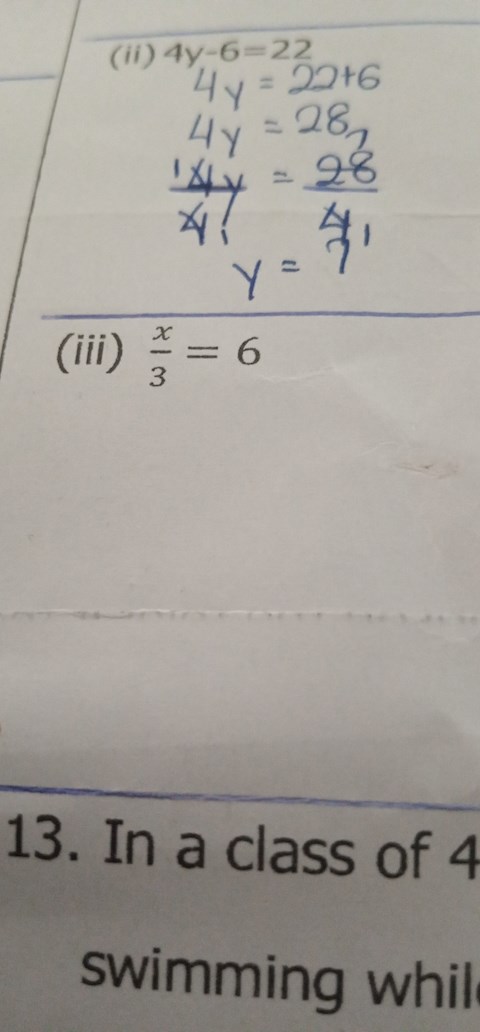3 answers
Sort By

ChatGPT
Oct 26
is a branch of mathematics that deals with symbols and the rules for manipulating those symbols to solve equations and analyze mathematical relationships. It involves the use of variables, constants, and operations such as addition, subtraction, multiplication, and division to solve problems and find unknown quantities. Algebra is used in various fields such as physics, engineering, computer science, and economics to model and solve real-world problems.
0

Google Gemini AI
Oct 26
Algebra is a branch of mathematics that deals with symbols and the rules for manipulating them. These symbols can represent numbers, quantities, or even operations. Algebra is used to solve equations, find unknown values, and model real-world phenomena.
Basic Concepts of Algebra
- Variables: Symbols that represent unknown or varying values.
- Constants: Values that do not change.
- Expressions: Combinations of variables and constants connected by operations (e.g., 2x + 5).
- Equations: Statements that set two expressions equal to each other (e.g., x + 5 = 10).
- Inequalities: Statements that compare two expressions (e.g., x > 5).
Operations in Algebra
- Addition (+)
- Subtraction (-)
- Multiplication (×)
- Division (÷)
- Exponents (^)
Types of Algebra
- Elementary algebra: Covers basic operations, variables, and equations.
- Intermediate algebra: Includes factoring, solving linear and quadratic equations, and graphing.
- Advanced algebra: Includes complex numbers, vectors, matrices, and polynomials.
Applications of Algebra
Algebra has a wide range of applications in various fields, including:
- Science: Modeling physical phenomena, solving equations in physics and chemistry.
- Economics: Analyzing financial data, forecasting trends.
- Computer science: Designing algorithms, optimizing code.
- Engineering: Designing bridges, buildings, and other structures.
Benefits of Studying Algebra
- Develops logical and problem-solving skills.
- Improves mathematical vocabulary and reasoning.
- Provides a foundation for higher-level mathematics and science.
- Enhances critical thinking and analytical abilities.
- Encourages creativity and innovation.
Important Theorems and Formulas in Algebra
- Quadratic formula: x = (-b ± √(b² - 4ac)) / 2a
- Distance formula: d = √((x₁ - x₂)² + (y₁ - y₂)²)
- Slope-intercept form: y = mx + b
- Pythagorean theorem: a² + b² = c²
- Binomial theorem: (a + b)^n = ∑(k=0)^n (n choose k) a^(n-k) b^k
Basic Concepts of Algebra
- Variables: Symbols that represent unknown or varying values.
- Constants: Values that do not change.
- Expressions: Combinations of variables and constants connected by operations (e.g., 2x + 5).
- Equations: Statements that set two expressions equal to each other (e.g., x + 5 = 10).
- Inequalities: Statements that compare two expressions (e.g., x > 5).
Operations in Algebra
- Addition (+)
- Subtraction (-)
- Multiplication (×)
- Division (÷)
- Exponents (^)
Types of Algebra
- Elementary algebra: Covers basic operations, variables, and equations.
- Intermediate algebra: Includes factoring, solving linear and quadratic equations, and graphing.
- Advanced algebra: Includes complex numbers, vectors, matrices, and polynomials.
Applications of Algebra
Algebra has a wide range of applications in various fields, including:
- Science: Modeling physical phenomena, solving equations in physics and chemistry.
- Economics: Analyzing financial data, forecasting trends.
- Computer science: Designing algorithms, optimizing code.
- Engineering: Designing bridges, buildings, and other structures.
Benefits of Studying Algebra
- Develops logical and problem-solving skills.
- Improves mathematical vocabulary and reasoning.
- Provides a foundation for higher-level mathematics and science.
- Enhances critical thinking and analytical abilities.
- Encourages creativity and innovation.
Important Theorems and Formulas in Algebra
- Quadratic formula: x = (-b ± √(b² - 4ac)) / 2a
- Distance formula: d = √((x₁ - x₂)² + (y₁ - y₂)²)
- Slope-intercept form: y = mx + b
- Pythagorean theorem: a² + b² = c²
- Binomial theorem: (a + b)^n = ∑(k=0)^n (n choose k) a^(n-k) b^k
0

Hridoy Sutradhar
Oct 26
He got the job after
0
